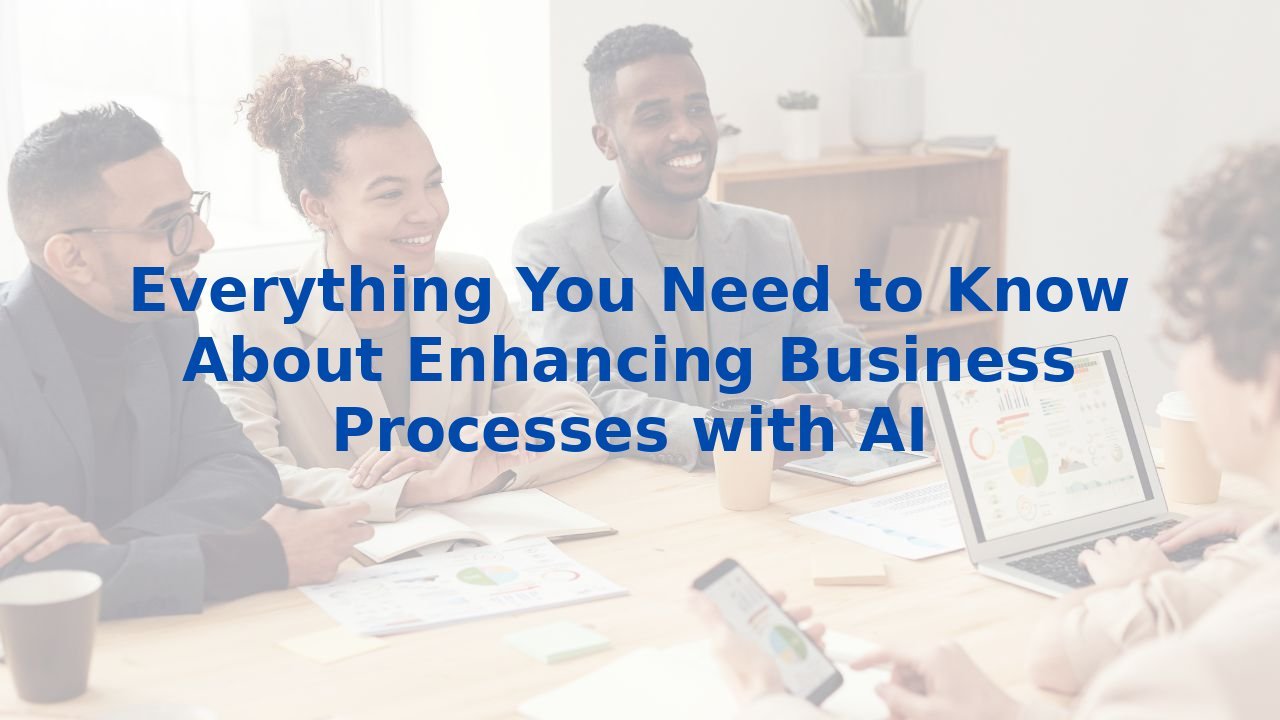Everything You Need To Know About Enhancing Business Processes with AI
Everything You Need To Know About Enhancing Business Processes with AI
In an era where competition is fierce and the pace of change is relentless, organizations are blossoming in their pursuit of operational efficiency. At the core of this pursuit lies a revolutionary force—Artificial Intelligence (AI). From refining decision-making processes to automating mundane tasks, AI has a transformative capability that breathes new life into traditional business processes. Let’s unravel how AI enhances various business processes and why employee training in AI is pivotal for maximizing its potential.
1. Data Analysis and Decision Making
Gone are the days when data analysis was slow, cumbersome, and prone to human error. AI is redefining the landscape by quickly processing vast amounts of data, revealing patterns and insights that inform strategic decisions. Whether it's predicting market trends or identifying operational inefficiencies, AI enriches decision-making with unparalleled clarity and depth. The result? Managers can make informed choices that drive business success.
2. Process Building and Automation
The efficiency of your workflows hinges on how well they are designed. AI introduces a new era in process mapping and automation. By automating the creation of workflows—not just the execution—organizations can save significant amounts of time and resources. By simply defining requirements, AI goes to work, ensuring that processes are optimized based on historical data. This leads to smoother operations and less manual management.
3. HR Processes
In Human Resources, AI serves as a catalyst for creating more equitable and personalized employee experiences. By automating administrative tasks, consolidating data for negotiation, and personalizing career paths, AI diminishes bias and enhances overall employee satisfaction. The simplicity of automating mundane tasks liberates HR teams to focus on strategic initiatives.
4. Sales Processes
Sales teams are leveraging AI to gain consistency and insight throughout the sales funnel. AI can intelligently recommend preferred sales channels and prioritizes leads based on historical interactions. Furthermore, AI-driven chatbots enrich the customer experience by providing immediate, informative responses, thereby enhancing engagement and satisfaction. The outcome? A more dynamic sales strategy that not only sells but builds relationships.
5. Customer Service
Through the lens of customer service, AI elevates the quality of interactions with real-time analysis of customer feedback. Automated chat systems can respond to inquiries instantly, while AI identifies patterns and anomalies in service calls. This dual-layered approach redefines efficiency, ensuring that customers receive timely and effective solutions.
6. Product Development
AI is a game changer for product development through its ability to employ generative design. By analyzing user input and parameters, AI suggests a multitude of design options, significantly reducing both development time and costs. As a result, companies can innovate faster, creating products that align closely with market demands.
7. Content Generation
Even in the creative space, AI holds remarkable potential. Businesses can utilize AI-driven content generation tools to create informative articles, marketing copy, and product descriptions at unprecedented speeds. This automation frees up human resources for higher-level strategic activities, truly unleashing creative potential. Efficiency is not just about speed; it’s about leveraging human strengths.
Benefits of AI in Business Process Management
Let’s distill the essence of AI’s impact on business processes:
- Improved Efficiency: AI reduces manual intervention, minimizes errors, and accelerates data analysis, which translates into faster decision-making.
- Enhanced Decision Making: Predictive analytics based on AI-generated insights empower businesses with actionable data, leading to informed tactical and strategic choices.
- Process Optimization: AI highlights bottlenecks and redundancies, allowing organizations to enhance efficiency and productivity significantly.
- Risk Management: Real-time monitoring by AI unearths anomalies and minimizes risks before they escalate.
The Importance of Employee Training
However, harnessing AI’s full potential depends heavily on your workforce. Employee training in AI is not just beneficial; it is essential. Training programs need to focus on:
- Understanding AI Capabilities: Equipping employees with knowledge about what AI can achieve encourages seamless integration into existing workflows.
- Data Interpretation: Ensuring employees can interpret insights provided by AI is crucial for making informed decisions.
- Process Adaptation: Training equips employees to not only utilize AI tools but also adapt processes for optimized productivity.
- Continuous Improvement: By fostering a culture focused on enhancement and innovation, organizations position themselves for agility in a dynamic landscape.
Conclusion
AI is not just another tool; it is a transformative force that reshapes the fabric of business process management. Whether it’s through improving data analysis, streamlining workflows, or enhancing employee experiences, the advantages are profound and far-reaching. By integrating AI and prioritizing training, organizations can usher in a new age of operational excellence, driving sustainable success in this ever-evolving environment. The journey towards enhanced efficiency has just begun, and the possibilities are as limitless as your imagination.



